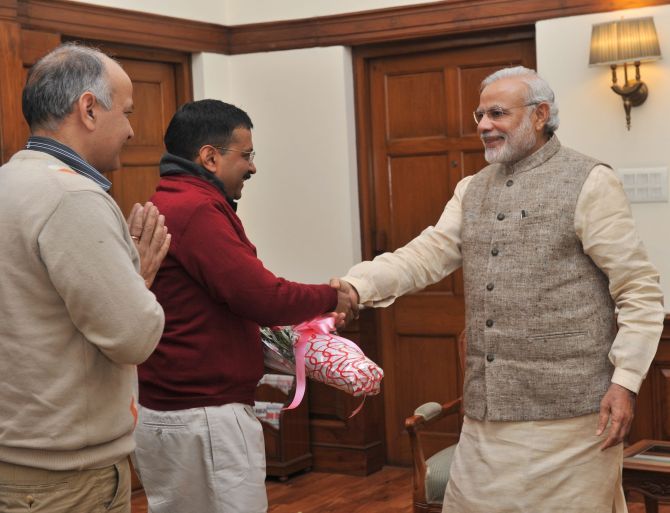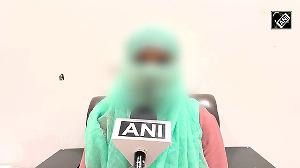
With the tide of public disillusionment rising against his government, Arvind Kejriwal is trying at least publicly to extend the olive branch to both Narendra Modi and Najeeb Jung.
Privately, he has confided to his confidantes that much as he dislikes it, he must do his best to soften these two reigning deities. Rashme Sehgal reports for Rediff.com
An Aam Aadmi Party delegation, led by Ashutosh, met Union Home Minister Rajnath Singh on October 21 demanding an inquiry into the abrupt transfer of Delhi's Value Added Tax Commissioner Vijay Kumar by Lieutenant Governor Najeeb Jung, shortly after a multi-billion rupee hawala racket was unearthed by his department.
The AAP leaders including Sanjay Singh and Dileep Pandey apprised Rajanth Singh about how Vijay Kumar had found 200 fake companies operating from a single-room address and having initiated a raid against them resulted in his removal .
'Why was the VAT commissioner transferred within a week of him swooping down on a big hawala racket? Why did the LG not consult the state government or even the Centre?' Ashutosh is reported to have asked Singh who promised to look into the matter.
Delhi Chief Minister Arvind Kejriwal does not believe in firing one cylinder at a time. While one phlanx of AAP leaders opened fire against Jung, Kejriwal, after maintaining a studious silence for some weeks, stepped up his attack against both Prime Minister Narendra Modi and the Delhi police.
A recent spate of toddler and child rape cases in the capital saw Kejriwal once again voice his demand that the Delhi police be brought under the state government's control.
Lashing out at the Centre, Kejriwal insisted, 'Give us control of the Delhi police. If we fail to control crime, take it back... I am not Sheila Dikshit. I will not remain silent if women are not safe.'
Most significantly, Kejriwal went on to declare, 'If rapes and crime against women keep happening, I will not let the prime minister sleep peacefully.'
Delhi Police Commissioner B S Bassi remained unmoved by this attack. One day after the chief minister's attack, Bassi met Jung at Raj Niwas where they remained in a huddle for over an hour. Following this meeting, Bassi announced a reward of Rs 25,000 for anyone helping expose corrupt practises by the police. Responding to Kejriwal's criticism, Bassi asserted that the Delhi government should focus on its work and allow the police to do their own.
Meanwhile, Delhi's Anti-Corruption Branch chief Mukesh Meena shot off a letter on October 20 warning Kejriwal, that he planned to initiate legal proceedings against the chief minister. This was being done after consultation with Jung and was clearly in retaliation to the chief minister having initiated disciplinary action against Meena.
Kejriwal finds himself hemmed in from all sides. Having frequent run ins with Jung is not going to help as the Centre has shown little inclination to remove the lieutenant governor. The situation is even more complicated vis-a-vis Modi. The state government finds itself besieged with the Centre extending little help to the AAP.
It is because he is so cornered that a savvier Kejriwal is using his second tenure as chief minister to turn the tables on his political opponents. Despite his frequent run ins with Jung, the chief minister has chosen to describe Jung as a 'good man with bad political bosses.'
He is trying to adopt the same approach with Modi. Only last month Kejriwal shot off a conciliatory letter to the prime minister, seeking Modi's help in resolving a host of tricky issues.
In the letter, the chief minister wrote he was 'willing to walk an extra mile' so that long pending uses would be resolved by 'two well meaning governments in the interest of Delhi... all that is required is a little open mindedness and primacy for the welfare of the people of Delhi.'
This is a very different tune from what Kejriwal had sung earlier when he accused the Prime Minister's Office of behaving like the 'Queen of England with the lieutenant governor as her Viceroy.' This accusation was made in the context of the home ministry giving absolute powers to Jung in the appointment of bureaucrats.
The AAP government finds itself trapped between the devil and the deep sea. To negotiate between the central government and Jung has proved difficult since neither side is willing to provide any assistance. The result is that governance of the capital city is showing a downward slide with cases of crime, violence and corruption showing an upward graph.
Jung often behaves as though he is dealing with a group of upstarts and not an elected government. When AAP Delhi unit convenor Dilip Pandey wrote to Jung last month seeking a meeting with him to deal with the issue of women's safety, Jung refused to meet him. Nor was the lieutenant governor willing to take a few basic steps to ensure women's safety by deploying marshals on Delhi's buses.
Said Pandey, 'We are a political party and have an elected government in Delhi. We can't compromise on our promises since we are a watchdog of the government's actions.'
Apparently chastened, Jung went on to ensure the presence of marshals on buses.
Commenting on the twists and turns in their relationship with Jung, Atishi Marlena, the former AAP spokesperson, without naming the PMO, said, "We all know politically who is calling the shots," but she felt the major problem being faced by the Kejriwal government is the multiplicity of governance authorities operating in Delhi.
"Delhi is the only state where the municipal corporation does not report to the elected state government," said Marlena. "The reason for this anomaly is because the Municipal Corporation of Delhi was in existence prior to the formation of the Delhi state government. The State Government Act needs to be changed, but this can be done only by an order from the central government; it is a central act."
Marlena says her party is trying to implement a slew of initiatives to ensure better governance at the grassroot levels including preparing a Swaraj Bill to ensure greater accountability.
But will these initiatives stem the growing public disillusionment with the AAP whose popularity has shown a sharp dip following the dengue epidemic?
AAP MLA Saurabh Bharadwaj feels it is unfair to blame the AAP government for non implementation of electoral promises. He cites the example of the dengue epidemic where the AAP government drew a lot of flak.
"The MCD claims we did not give them the money, but on March 31, our government transferred Rs 213 crore (Rs 2.13 billion) to the MCD from which Rs 60 crore (Rs 600 million) was given specifically for public health. This money should have been spent on fumigation and on other protective measures," the MLA says.
"The money has remained unspent. If indeed the money had not been allocated, then what stopped the MCD from appealing to the Delhi high court or going public about non-availability of funds?" Bharadwaj asks.
Another area of public disillusionment is with the increasing traffic mismanagement in the city. "Traffic management is in the hands of the traffic police," Bharadwaj says, "which again comes under the central government. I believe the central government is deliberately inconveniencing the Delhi public by not getting the traffic police to act efficiently. If some of the vulnerable points in the city are not monitored, it results in congestion and jams for which we (the AAP government) are being blamed."
"People from the lower economic strata can see a tangible change in the functioning of the state government, whether it be in government schools or in the availability of rations," the MLA says. "Since the middle and upper class have a much smaller interaction with the government, they are not in a position to realise an improvement in services."
Kejriwal knows only too well that his hands are tied. His power is extremely limited. He realised this during the dengue epidemic when the state government could not hire additional staff to assist over-stretched bureaucrats.
With the tide of public disillusionment rising against his government, the chief minister is trying at least publicly to extend the olive branch to both Modi and Jung. Privately, he has confided to some of his confidantes that much as he dislikes it, he must do his best to soften the two reigning deities.
IMAGE: Prime Minister Narendra Modi greets Delhi Chief Minister Arvind Kejriwal and Deputy Chief Minister Manish Sisodia.











